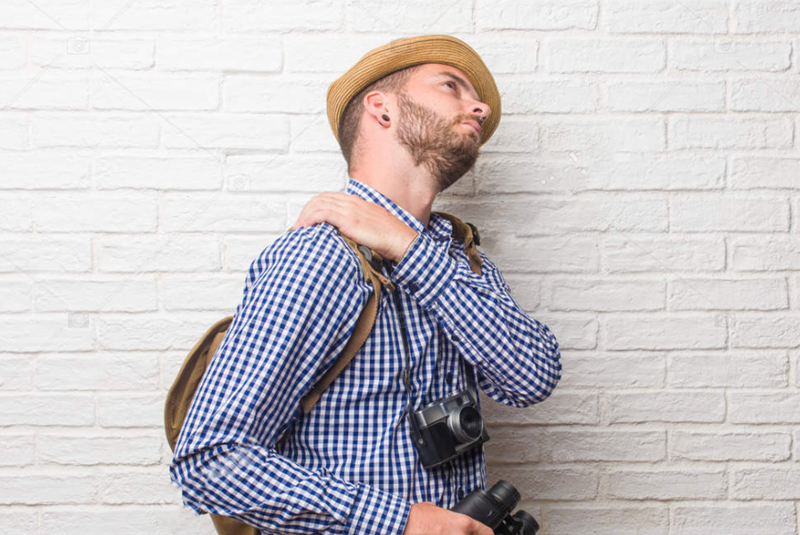Have you had pain from wearing a backpack when you are going back and forth to work or classes each day? Have you found strap marks of your backpack show on your shoulders or you cannot act the way you like but your posture changes while wearing your backpack in the process of hiking? Have you felt tingling or numbness in your limbs or felt difficult to put on or take off your travel backpack when you are surrounded by the magnificent natural world, trying to explore more, but you found you cannot even bear the pain of a “harmful” travel backpack! Suddenly you may feel upset about the idea of going out to see the world.
Your backpack may seem harmless, but if it is overloaded, you may suffer a lot of harm, such as back and neck problems, etc..
Here are some statistics on carrying an overweight backpack on uihc.org website:
-
2,000 backpack-related injuries each year, according to a national ER poll
-
55 percent carry loads greater than 10 percent of their body weight, according to a study of grade-schoolers
-
85 percent had discomfort and pain due to backpack use, according to a study of college students
-
80 percent had less pain and body strain when they changed how they loaded and wore their backpacks, according to a study of middle schoolers
Prof. Amit Gefen of TAU's Department of Biomedical Engineering and Prof. Yoram Epstein of TAU's Sackler Faculty of Medicine, along with PhD student Amir Hadid and Dr. Nogah Shabshin of the Imaging Institute of the Assuta Medical Center, have determined that the pressure of heavy loads carried on the back have the potential to damage the soft tissues of the shoulder, causing microstructural damage to the nerves.
Based on data collected by MRI, Profs. Gefen and Epstein developed anatomical computer models of the shoulders. These showed how pressure generated by the weight of a backpack load is distributed beneath the skin and transferred to the brachial plexus nerves. The models also account for mechanical properties, such as the stiffness of shoulder tissues and the location of blood vessels and nerves in the sensitive areas which are prone to damage.
Extensive mechanical loading was seen to have a high physiological impact. "The backpack load applies tension to these nerves," explains Prof. Gefen. He notes that the resulting damage "leads to a reduction in the conduction velocity -- that is, the speed by which electrical signals are transferred through the nerves." With a delay or reduction in the amplitude or the intensity of signals, nerve communication cannot properly function, he says.
These results apply to people from all walks of life, says Prof. Gefen. Many professions and leisure activities, such as hiking or traveling, involve carrying heavy backpack load on the back.
The research was published in the Journal of Applied Physiology.
Moreover, according to the Members of the UI Hospitals & Clinics Rehabilitation Services team, an overweight backpack causes the body to compensate for the extra weight. If you lean forward to compensate, it reduces your balance making it easier to fall. The extra weight can distort the natural curve of the middle and lower back, causing muscle strain.
These team members recommend you carry no more than ten percent of your weight in a backpack. If you weigh 150 pounds, you should carry no more than 15 pounds in a travel backpack.
Back to our reality, we must carry a heavy backpack to schools, to offices or to have a business trip. What can we do to prevent us from the harm of the overloaded backpack?
The first effective move is to find a lightweight backpack!
NayoSmart has some recommended lightweight travel bags for men:
Nayo Almighty is born for work & play & travel. Its net weight is less than 5 pounds, and 5 pounds never hurt an adult man! The strong handle will free your hands, and ensures you have a comfortable using experience. Internal Mesh Dividers will remind you to keep the backpack to the essentials (only carry the necessities for different occasions) and secure items in compartments so they don’t shift, including Interior Key Chain Holder, Interior Zipper Pocket, Interior Slot Pocket, Cell Phone Pocket. This is a very functional and health-friendly travel backpack.
Nayo EXP Backpack fits 17.3 Laptop will impress you with its amazing hidden roomy space and its built-in charging cable which can provide a more convenient way to charging your phone, and free your hands from the power bank. High-quality soft straps will not leave you achy strap marks, and we suggest you use both straps so your posture is even and snug the straps to keep the backpack from slipping below your hip bone.
Some other effective tips from UI Hospitals & Clinics Rehabilitation Services team are:
-
Place heavier items closer to the back center and put lighter items out front.
-
Lift with your legs, bending at the knees, and not with your back. Don’t lift and wiggle at the same time.
-
Use both straps so your posture is even. Snug the straps to keep the backpack from slipping below your hip bone.
-
If you must carry more than the safe weight, use a wheeled backpack.
A suitable backpack is not merely a backpack, it will keep you away from harm and satisfies you in your daily life.
Source:
https://www.sciencedaily.com/releases/2013/02/130221141604.htm
https://uihc.org/health-topics/your-backpack-too-heavy




Share:
How to Travel in An Eco-friendly Way
How to Choose An Ideal Business Travel Bag